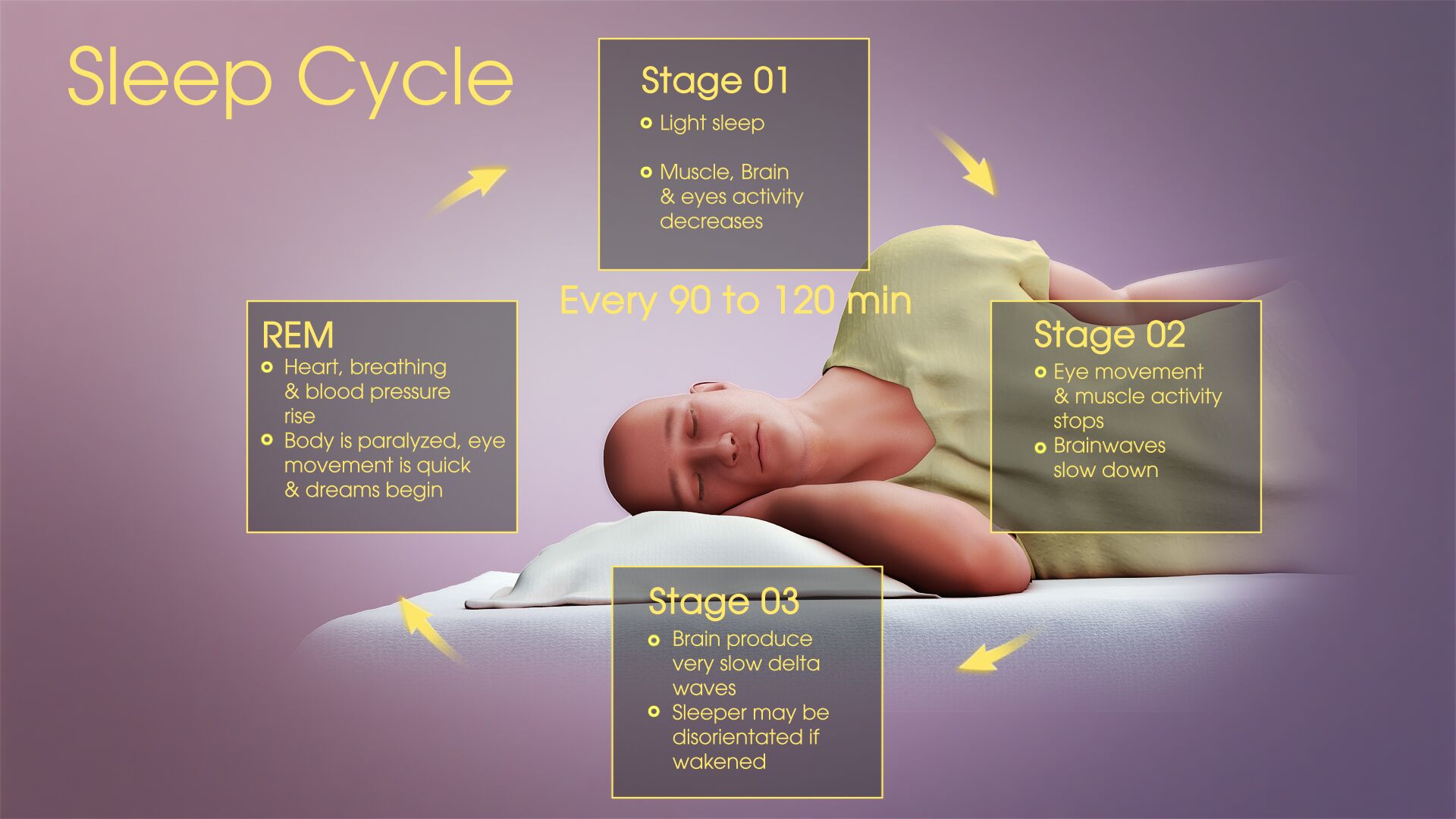Sleep may seem simple and static, but, in reality, sleep is a complex and dynamic process. Researchers have discovered distinct, measurable changes in both the body and brain, occurring regularly and predictably throughout the night.
Sleep can be typically divided into stages 1, 2, 3 and a fourth Rapid Eye Movement (REM) stage. Stages 1, 2, 3 comprise non-REM sleep that normally stretches over a span of 90 minutes, followed by a period of REM sleep.
The 4 stages constitute a single sleep cycle. Human bodies naturally advance through each stage in sequence and complete three or four sleep cycles per night, over an approximate period of eight hours.
Understanding the progression of sleep through each stage:
-
Stage 1 non-REM sleep: The first stage is the transition from wakefulness to sleep, and is hence, quite shallow and not restful. The phase lasts for a few minutes and the person remains ‘aware’ of his surroundings. Heartbeat, breathing, and eye movement slows down, and the muscles begin to relax. The brain waves, too, experience a dip from their daytime wakefulness patterns.
- Stage 2 non-REM sleep: Besides REM sleep, people spend the most time in this ‘light sleep’ period. Heartbeat and breathing rate reduces, and muscles relax even further. The body temperature drops and eye movements come to a halt. Brain wave activity slows but is marked by brief bursts of electrical activity. The sleeper can be easily awakened. This stage is crucial for body maintenance and he body regulates metabolism, while the brain processes memories and emotions.
- Stage 3 non-REM sleep:This is the period of ‘deep sleep’ when the heartbeat and breathing slow to their lowest levels. Brain waves become even slower and the body muscles so relaxed that its difficult to wake up. The brain is shut and no dreaming occurs. However, the body is active in rebuilding and repairing.
- Rapid Eye Movement (REM) sleep: REM accounts for up to 20-25% of total sleep time in adult humans. The first period of REM typically lasts 10 minutes; while each of the later stages get longer, and the final one may last upto an hour.
As the name suggests, the eyes move rapidly from side to side behind closed eyelids. Brain wave frequency becomes closer to that seen in wakefulness. Also, breathing and heart rate become rapid and irregular. The brain is very active during REM sleep, yet the body is very inactive.
REM is very important for emotion regulation and memory. It’s also the peak of protein synthesis at the cellular level that is crucial for proper body function.
As there is increased brain activity, REM sleep is often associated with dreaming. During this stage, most people are likely to experience a state of temporary paralysis as the brain signals the spinal cord to cease the movement of arms and legs. This lack of muscle activity or atonia may be a protective mechanism to prevent injury caused by acting out dreams.
Because the body is immobilized yet the brain is active, this stage of sleep is often referred to as ‘paradoxical sleep’.
The proportion of REM decreases with age (a newborn baby may spend 80% of total sleep time in the REM stage).
It’s important to note that the body cycles through all of these stages multiple times a night and the amount of time spent in each stage keeps varying.
Why is REM so vital?
REM is the sleep stage that helps us feel ‘refreshed’ in the morning. An interrupted sleep often sacrifices this last stage in the sleep cycle to occur.
“Too little REM sleep can leave you feeling groggy, less able to focus, and might lead to memory problems.” says Michael Grandner, MD, director of the Sleep and Health Research Program at the University of Arizona in Tucson.
REM sleep helps our brains to detox. Neurotoxins, and waste products like beta-amyloid (found in people with Alzheimer's disease) are cleared during REM. Therefore, less REM sleep means limited time spent in processing information and sweeping the brain clean of toxic proteins.
Your sleep-wake cycle is governed by melatonin, a hormone that tells the body that it is night, helping to make you sleepy. If you delay that signal, you could delay sleep. And if you do that for many years, it disrupts the circadian system, often accompanied by serious health consequences.
Read More..










